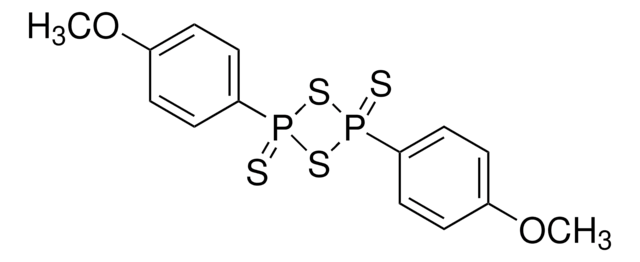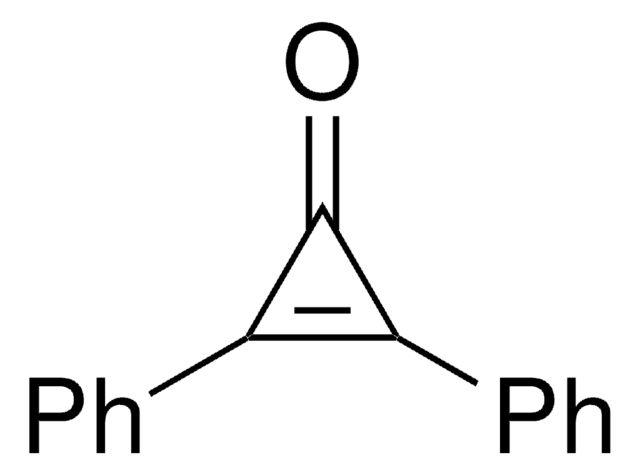339792
3,4-Dibutoxy-3-cyclobutene-1,2-dione
98%
Synonym(s):
Dibutyl squarate
Sign Into View Organizational & Contract Pricing
All Photos(3)
About This Item
Linear Formula:
[CH3(CH2)3O]2C4(=O)2
CAS Number:
Molecular Weight:
226.27
MDL number:
UNSPSC Code:
12352100
PubChem Substance ID:
NACRES:
NA.22
Recommended Products
Quality Level
Assay
98%
form
liquid
refractive index
n20/D 1.494 (lit.)
bp
139 °C/0.5 mmHg (lit.)
density
1.047 g/mL at 25 °C (lit.)
functional group
ether
ketone
SMILES string
CCCCOC1=C(OCCCC)C(=O)C1=O
InChI
1S/C12H18O4/c1-3-5-7-15-11-9(13)10(14)12(11)16-8-6-4-2/h3-8H2,1-2H3
InChI key
XBRWELTXMQSEIN-UHFFFAOYSA-N
Related Categories
General description
3,4-Dibutoxy-3-cyclobutene-1,2-dione is the dialkyl ester of squaric acid.
Application
3,4-Dibutoxy-3-cyclobutene-1,2-dione was used in the synthesis of novel semisquarylium dye, useful for highly selective Hg2+ sensing in aqueous media. It was also employed in the synthesis of 3-butoxy-4-(1,3,3-trimethyl-2,3-dihydro-1H-2-indolylidenemethyl)-3-cyclobutene-1,2-dione, intermediate for the synthesis of squaryl dyes.
Signal Word
Warning
Hazard Statements
Precautionary Statements
Hazard Classifications
Eye Irrit. 2 - Skin Irrit. 2 - Skin Sens. 1 - STOT SE 3
Target Organs
Respiratory system
Storage Class Code
10 - Combustible liquids
WGK
WGK 3
Flash Point(F)
235.4 °F - closed cup
Flash Point(C)
113 °C - closed cup
Personal Protective Equipment
dust mask type N95 (US), Eyeshields, Gloves
Choose from one of the most recent versions:
Already Own This Product?
Find documentation for the products that you have recently purchased in the Document Library.
Treatment of alopecia areata in children.
Niyati Mukherjee et al.
Pediatric annals, 38(7), 388-395 (2009-08-19)
Shigeki Inui et al.
The Journal of dermatology, 36(6), 323-327 (2009-06-09)
To study the effect of fexofenadine on extensive alopecia areata (AA), we evaluated retrospectively 121 patients with AA having alopecia in more than 50% of the scalp and followed them for at least 6 months. Patients were treated by immunotherapy
Yayoi Shimaoka et al.
The Journal of dermatology, 35(3), 151-153 (2008-03-19)
A 57-year-old Japanese male patient with an 18-year history of discoid lupus erythematosus (DLE) presented with alopecia on his scalp, and was clinically diagnosed to have alopecia areata. He was started on topical immunotherapy with squaric acid dibutylester (SADBE) for
Synthesis of novel squaraine dyes and their intermediates.
Tatarets AL, et al.
Dyes and Pigments, 64(2), 125-134 (2005)
Eileen Tan et al.
International journal of dermatology, 41(11), 748-753 (2002-11-28)
Alopecia areata is believed to be an autoimmune condition with a worldwide occurrence. It usually presents as patchy, nonscarring hair loss. There is a paucity of clinical data in Asians. To study the epidemiology, clinical aspects, associations, and treatment of
Our team of scientists has experience in all areas of research including Life Science, Material Science, Chemical Synthesis, Chromatography, Analytical and many others.
Contact Technical Service









